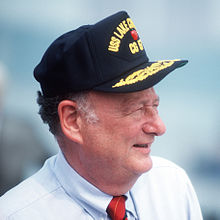
(Photo: Wikipedia)
NEW YORK (Press Release) — New York City mayors have a world stage on which to strut, and they have made legendary use of it. Yet few have matched the bravado, combativeness and egocentricity that Ed Koch brought to the office during his three terms from 1978 to 1989. As Neil Barsky’s Koch recounts, Koch was more than the blunt, funny man New Yorkers either loved or hated. Elected in the 1970s during the city’s fiscal crisis, he was a new Democrat for the dawning Reagan era—fiscally conservative and socially liberal. Koch finds the former mayor politically active to the end (he died in 2013)—still winning the affection of many New Yorkers while driving others to distraction.
Koch has its national (and San Diego) broadcast premiere on Monday, Sept. 22, 2014 at 10 p.m. on PBS’s POV (Point of View) documentary series. (Check local listings.) It will stream on POV’s website www.pbs.org/pov/koch from Sept. 23 – Oct. 22, 2014.
Koch opens with a glittering, nighttime aerial descent over New York and the former mayor recalling how he used to feel flying into town: “This belongs to me. Extraordinary. Thank you, God!” Koch, then 86, is seen campaigning on a street corner in 2010 for an African-American state assembly candidate from Brooklyn. Later the sequence cuts to Koch on a street corner in 1977, campaigning for mayor, happily pronouncing his signature phrase, “How’m I doin’?”
In the late ’70s, New York was on the precipice of bankruptcy, dependent on the state and federal governments for its survival. It was also a hotbead of crime and racial strife.
Koch transformed himself from a little-known liberal congressman to a law-and-order candidate who cut deals with key constituencies to defeat the incumbent, Abe Beame, as well as New York Secretary of State Mario Cuomo and such Gotham luminaries as Bella Abzug, Herman Badillo and Percy Sutton. Koch’s constant companion during the 1977 mayoral campaign was former Miss America Bess Myerson, who helped mute whispers that he was gay.
The film traces the rise in Koch’s popularity during three terms in office, but there was always friction. Koch gets credit for restoring New York’s fiscal health and securing billions of dollars to improve its housing (which he claimed helped reduce crime). He expanded police powers and rallied New Yorkers on the city’s bridges during the infamous 1980 transit union strike.
But closing down Harlem’s Sydenham Hospital was a decision he later regretted, even as he insisted that previous mayors had wanted to do the same, “but didn’t have the guts.” Corruption scandals erupted in Koch’s third term—Queens Borough President Donald Manes committed suicide rather than go to jail, and stiff sentences were handed out to other powerful politicians by young district attorney Rudy Giuliani—and scuttled Koch’s attempt at a fourth term.
Cutting back to the present, we see the 86-year-old Koch glad-handing at campaign stops, schmoozing with political well-wishers and appearing on television and radio. Then, on election night 2010, the man he endorsed, governor-elect Andrew Cuomo, son of his bête noir, Mario Cuomo, snubs him. Koch’s spirits brighten at his Gracie Mansion birthday party, when Mayor Michael Bloomberg announces that the 59th Street Bridge will be renamed in his honor (a move denounced by Councilman Charles Barron and others in the black community).
Koch had made preparations for his death. In one of the film’s most touching moments, he and his former chief of staff Diane Mulcahy Coffey visit his cemetery plot. The bottom of his headstone reads: “He was fiercely proud of his Jewish faith. He fiercely defended the City of New York, and he fiercely loved its people. Above all, he loved his country, the United States of America, in whose armed forces he served in World War II.” Also on the headstone are Wall Street Journal reporter Daniel Pearl’s last words before he was beheaded by Pakistani terrorists: “My father is Jewish, my mother is Jewish, I am Jewish.”
Koch died of congestive heart failure at the age of 88 on Feb. 1, 2013 — 11 years to the day after Pearl’s murder.
“Making a documentary about Ed Koch was an easy call,” says first-time director Neil Barsky. “To this day, I cannot think of a New Yorker as popular or as polarizing. Ed Koch’s story is in many ways the story of the city. New York in those days was dangerous, dirty and utterly dysfunctional; it was also magical.
“From World War II and until only recently, it was almost an article of faith that the United States’ big northern cities only deteriorated; they could never get better. Somehow, New York City defied that trend, and it did so, I think, because it kept itself open—to immigrants, to business, to artists and poets. In my view, the very imperfect Ed Koch intuitively understood what made New York special, and I believe he is as responsible for the New York City of today as anyone alive.”
Koch is a Zeitgeist Films Release.
*
Preceding provided by the Public Broadcasting System